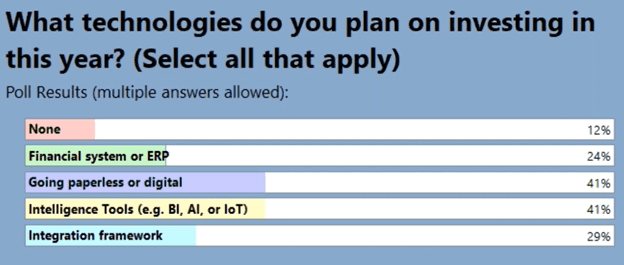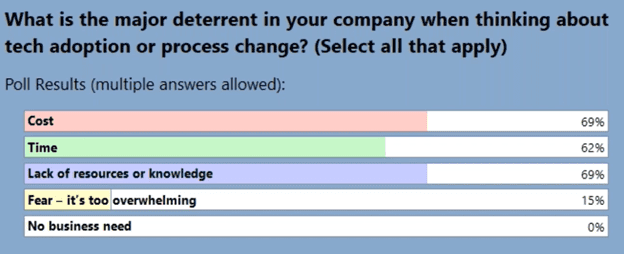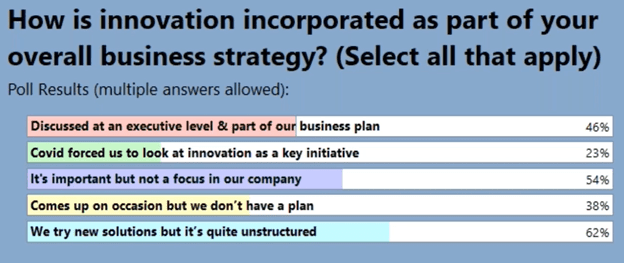.png?width=352&name=Untitled%20design%20(6).png)

Our first Online Mixer featuring PwC Partner and AI expert, Marin Ivezic, on the Risks & Rewards of Adopting Emerging Technologies
The importance of adopting emerging technologies is increasing globally. With the rapid technological advances that happen every year, companies must commit to having a digital strategy in place to stay competitive. While adopting emerging technologies can come with risks, the payoff in improvements in the employee and customer experience is often unmatched.
When it comes to understanding the Risks of Emerging Technologies, Marin Ivezic has been immersed in different global markets based on his background as both a Best-Selling Author and Partner of Cybersecurity & Privacy at PwC. Marin has spent the last 30 years living and working in Silicon Valley, Europe, China and the rest of Asia, giving him a unique perspective on how emerging technologies shape different societies and what challenges they might bring. Marin and VistaVu’s VP of R&D and Technology, Jeremy Crossman, sat down to discuss technology trends, cybersecurity and how companies can take actionable steps to digitize operations and automate workflows.
The following Q&A has been edited for length and clarity. We posed poll questions as a way to understand our audience to provide them with relevant insights.

Jeremy Crossman [JC]: It looks like going paperless or using digital and intelligence tools are our leaders here. Marin, what are your thoughts on these results?
Marin Ivezic [MI]: This matches what we are currently observing in the industry through various polls and surveys. Going paperless or digital has been a key investment target for a lot of organizations, but I think the pandemic accelerated some of these intelligence tools and digitization initiatives this year.
When we talk about emerging technologies, there are many definitions of what that term means, but simply put we are looking at technologies that have promised to create significant value in business or society. Some of the key ones range from IoT to Augmented Reality, to Analytics and Artificial Intelligence and Machine Learning. When doing research for my book, we tracked over 300 technologies that we considered “emerging”.
JC: Even though there are over 300 different emerging technologies, most companies I’ve worked with are really just focusing on the top three – AI, Machine Learning and Industrial IoT. If we look at the business side, what are companies adopting the most? How is this making them more competitive?
MI: It is clear that financial systems, ERP, integration frameworks, digitization and the removal of paper are becoming the trends in the past. We are starting to see a shift in different industries.
Some organizations have reduced their investment in innovation and digitization, but there are many organizations that have doubled down on their investment. Those companies have started digitizing and automating their cyber-physical systems and moved to e-commerce where they had previously not put much effort.
We see retailers accelerating their plans to have fully automated distribution centers and delivery, with the goal to reduce the reliance of humans throughout the supply chain.

JC: I’m glad to see that everyone believes there is a business need – what are your thoughts, Marin?
MI: This is excellent. Even in a similar poll 2 or 3 years ago, people would not be able to identify the business need. I understand why Cost is a major deterrent, especially given the current economy. However a lot of these business technologies have a good business case cost-wise. It may take some time to achieve cost benefits, however organizations that are most successful are those that do think longer term and try to adopt new technologies even if the payback doesn’t happen for a couple of years.

JC: It’s great to see that businesses are experimenting with different types of tech.
MI: I have to say I’m disappointed that the answer “It’s important but not a focus” is ranking so high. Technology is accelerating so quickly – while it previously may have been acceptable to wait and adopt after a couple of years, in order to stay competitive now, you really need to think about adoption in months. Every industry should have a focus on technology and innovation.
JC: As technology continues to develop faster and faster, the gap seems to be widening like an escape velocity. Those who are implementing technology will be so ahead of the game that it will be impossible to catch up.
MI: That’s exactly what’s happening in my mind. As this new technology innovation and adoption is accelerating more quickly the gap continues to grow.
JC: Are there certain risks in different types of tech that people should be aware of?
MI: That’s an interesting question. On the one hand I manage the risk of emerging technologies, so I should be risk adverse. However, I feel that with any technology, the economic and societal benefits far outweigh the risks. We just need to manage the risks appropriately. The risk of being outcompeted and left behind in this technological acceleration is bigger than the risks of adopting technology.
JC: What is required in companies these days to align their internal teams for technological adoption?
MI: Based on research from PwC, we identified and analyzed 5% of companies that regularly perform better, and one of the most commonly found traits is that they don’t see technology innovation as an IT problem. Successful organizations see technology innovation as a combined effort from IT, Business and Employee and Customer Experience. It’s a joint view of technology innovation that helps them drive business benefits. They achieve this by mandating collaboration between the different silos within an organization.
JC: Where do people start? There 300+ types of emerging technologies, so I’m sure it can be very overwhelming for companies.
MI: There is not anecdotal evidence that provides a rule of thumb approach. Different organizations succeed for different reasons. Typical approaches include a review of emerging technologies, creation of a business case, adopting in a smaller scale and then expanding if possible.
It’s all about building resilience and understanding that it’s OK to fail. Companies need to quickly adapt to changes in the market.
If you have any questions on how your company can take actionable steps towards digitization, or if you’d like a free company assessment to understand your digital maturity, please contact us.
.png?width=352&name=Untitled%20design%20(6).png)



VistaVu creates solutions for your business.
Offices in Calgary, Houston, Dallas, Denver, & New York.
Call us at 1-888-300-2727 ext. 105

